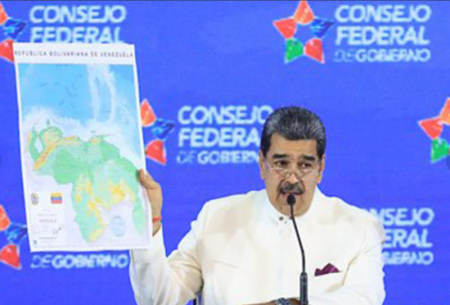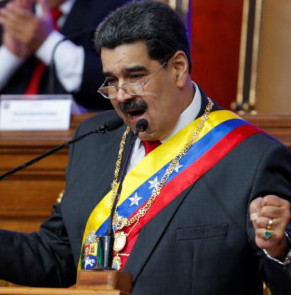
The Maduro government has gone much further in its previously announced intent to "restore justice" as regards the so-called Essequibo zone — an area of 160 000 square kilometers disputed by both Venezuela and Guyana. Caracas is taking steps to implement what was approved at the December 3 referendum featuring 95% support for making Essequibo part of Venezuela.
The official reason for the region’s fate having been put to a popular vote by the Venezuelan government is the country’s long-standing dissent over Britain's annexation of the area in the 19th century and its merger into its former Guiana colony, which became Guyana after proclaiming independence in 1966. Venezuela has irrefutable historical evidence that London simply robbed its weaker young neighboring state of Venezuela. The heist was legalized by the Paris arbitration court, which, as documented later, acted unlawfully to London’s advantage. These are the arguments Venezuela raises like a flag in its dispute with Guyana.
By a special law, with its draft already announced, the Venezuelan government is willing to create a "new Venezuelan province or state" in this territory called Guyana-Essequibo. The zone’s interim head will be Major General Alexis Rodríguez Cabello, an MP with the United Socialist Party of Venezuela. His administration will temporarily operate in the town of Tumeremo in the southern state of Bolivar known for its mining projects and close to the old border with Guyana.
Venezuela’s Nicolas Maduro has instructed the PDVSA state oil company to map resource exploration and development in the Essequibo area. And the Parliament was told to draft a bill banning all the oil concessions granted by Guyana in the territorial waters, particularly to America’s Exxon Mobil, a company owning a functioning offshore platform on the Guyanese shelf. Maduro announced that Caracas "gives three months to the companies that are exploiting resources there without permission." In other words, ExxonMobil and other foreign companies must wrap up activity in the area unless granted permission from Venezuela. Maduro urged the country's parliament to create "nature protection zones and national parks" in this territory.
At the same time, Venezuela redeployed its military contingent to the coastal area of its northeastern Delta Amacuro state close to the border with Guyana. This is supposed to indicate Venezuela's strong intent to carry out its pledge of regaining control over the Essequibo zone, and expel American oil companies.
Guyana, for its part, has been railing against it and is known to have already turned to the United States for help. "We are very concerned that President Maduro and the government of Venezuela can use their own internal scenario and internal politics to create an instability within our region," Guyanese President Mohamed Irfaan Ali said. "We are working with our partners from the US Departments of State and Defense to ensure that Guyana is protected and ready to act as a country that respects the rule of law and international order."
The President of Guyana said that despite tensions caused by Venezuela’s referendum approving of Essequibo annexation, investors of companies such as Exxon Mobil have not hung up their hats in Guyana's concession zones. He said other countries apart from the US do have a finger in the pie. "Exxon Mobil is part of a consortium that includes Chinese and many other companies from the Western hemisphere, the UK, the European Union, the Arab world, that recently participated in a new distribution auction for oil production sites. The attitude from any of our investors has not changed," said Mohamed Irfaan Ali.
In the Essequibo dispute, patriotism is closely intertwined with enormous economic benefits for both Venezuela and Guyana. In 2015, huge oil reserves were discovered in Essequibo, which Exxon Mobil is currently developing.
At the same time, critics of the Venezuelan leader claim that the referendum was directly related to the presidential race of 2024, which President Nicolas Maduro intends to win. The election results from an agreement between Caracas and Washington, stipulating for eased sanctions against Venezuela in exchange for a "transparent election". There is reason to believe that Maduro raised the old issue of sovereignty over Essequibo just ahead of the campaign, with its date yet to be announced. It can rally up all the Venezuelans, whether it be Maduro’s followers or opponents. And he therefore relies on massive electoral support. The Venezuelan president has made it clear to the world that his people fully endorse his Essequibo intentions.
Meanwhile, neither side intends to back down. Caracas' demand to actually tear Essequibo away from Guyana may drastically complicate its international clout. Moreover, President Maduro’s bellicose rhetoric has the potential to engineer a military conflict in the area to engage the United States and Great Britain, the former colonial metropolis of Guiana, now Guyana. So far, it is still about political tension.
Brazil, which borders both Venezuela and Guyana, is worried about the Essequibo dispute scale, forcing President Lula da Silva speak to both Nicolas Maduro and Irfan Ali. Brasilia has defiantly though symbolically increased its military presence at the border from 70 to 130 people. This minor contingent’s mission is to "monitor and protect the national territory."
After the consultative referendum, Lula decided to send an additional twenty armored vehicles to the trijunction in another demonstrative act. Brazil expects no surge in military activities over the aggravated territorial dispute between Venezuela and Guyana. "We are following the situation with concern, but I don’t think it’s going to come to that [an armed confrontation]," Brazilian Foreign Ministry spokeswoman Gisela Padovan said. The diplomat is sure that "the good offices by Brazil and other neighboring countries will provide for soft-pedalling the process."









